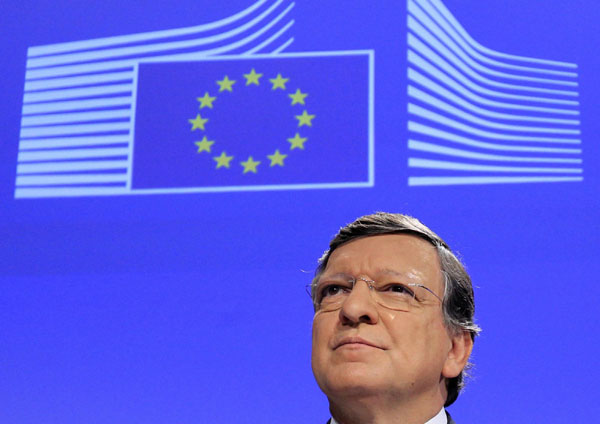EU wins 2012 Nobel Peace Prize
Updated: 2012-10-12 19:28
(Agencies)
|
||||||||
|
 |
|
European Commission President Jose Manuel Barroso makes a speech at the EC headquarters in Brussels October 12, 2012, after the European Union won the Nobel Peace Prize for its long-term role in uniting the continent, the Norwegian Nobel Committee said, an award seen as morale boost for the bloc as it struggles to resolve its debt crisis. [Photo/Agencies] |
OSLO - The European Union won the Nobel Peace Prize on Friday for its historic role in uniting the continent in an award seen as a morale boost as the bloc struggles to resolve its economic crisis.
The award served as a reminder that the bloc had largely brought peace to a continent which tore itself apart in two world wars in which tens of millions died.
The EU has transformed most of Europe "from a continent of wars to a continent of peace," Nobel Committee chairman Thorbjoern Jagland said in announcing the award in Oslo.
"The EU is currently undergoing grave economic difficulties and considerable social unrest. The Norwegian Nobel Committee wishes to focus on what it sees as the EU's most important result: the successful struggle for peace and reconciliation and for democracy and human rights," he said.
He praised the EU for rebuilding Europe after World War Two and for its role in spreading stability after the fall of the Berlin Wall in 1989.
But the debt crisis afflicting the single currency zone has brought economic instability to several member states, and rioting has erupted on the streets of Athens and Madrid as austerity measures have bitten hard.
The prize, worth $1.2 million, will be presented in Oslo on Dec. 10. The decision by the five-member panel, led by Jagland who is also Secretary-General of the Council of Europe, was unanimous.
The EU won from a field of 231 candidates including Russian dissidents and religious leaders working for Muslim-Christian reconciliation.
Conceived in conditions of great secrecy at a chateau near Brussels, what is now the European Union was created by the 1957 Treaty of Rome, signed with great fanfare in the Italian capital's 15th century Palazzo dei Conservatori.
The six-state 'common market' it founded grew into a 27-nation European Union ranging from Ireland's Atlantic shores to the borders of Russia.
At the time the Cold War was in full train after Soviet tanks put down an anti-communist rebellion in Budapest. Western countries led by the United States had formed the NATO military alliance and the Kremlin responded with the Warsaw Pact.
But the EU is now mired in crisis with strains on the euro, the common currency shared by 17 nations.
Politicians in Germany, one of the main forces behind the foundation of the EU, were delighted with the award.
Former Chancellor Gerhard Schroeder said: "This is an important and the right decision by the Nobel Prize Committee and a big encouragement for the people in Europe."
The peace prize is "a clear signal to those in Europe, who in alluding to supposed national interests, endanger the work of European unity," said former foreign minister Hans-Dietrich Genscher.
The European Union's top official, Herman Van Rompuy, said he was proud the bloc's peace credentials had been rewarded.
"We have established peace thanks to the European Union. So the European Union is the biggest peacemaker in history," he said.
After centuries of war on the continent the EU has been at peace within its borders, but its effort to stop war in former Yugoslavia -- hailed by one minister as "the hour of Europe" -- was a failure.
The British government, less committed to the European ideal than other EU members, made no comment. Ed Balls, a senior member of the opposition Labour Party, remarked: "They'll be cheering in Athens tonight, won't they?"
Nigel Farage, leader of Britain's fiercely eurosceptic UKIP party, added: "This goes to show that the Norwegians really do have a sense of humour."

 Relief reaches isolated village
Relief reaches isolated village
 Rainfall poses new threats to quake-hit region
Rainfall poses new threats to quake-hit region
 Funerals begin for Boston bombing victims
Funerals begin for Boston bombing victims
 Quake takeaway from China's Air Force
Quake takeaway from China's Air Force
 Obama celebrates young inventors at science fair
Obama celebrates young inventors at science fair
 Earth Day marked around the world
Earth Day marked around the world
 Volunteer team helping students find sense of normalcy
Volunteer team helping students find sense of normalcy
 Ethnic groups quick to join rescue efforts
Ethnic groups quick to join rescue efforts
Most Viewed
Editor's Picks

|

|

|

|

|

|
Today's Top News
Health new priority for quake zone
Xi meets US top military officer
Japan's boats driven out of Diaoyu
China mulls online shopping legislation
Bird flu death toll rises to 22
Putin appoints new ambassador to China
Japanese ships blocked from Diaoyu Islands
Inspired by Guan, more Chinese pick up golf
US Weekly

|

|






